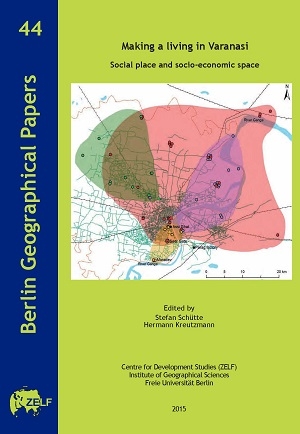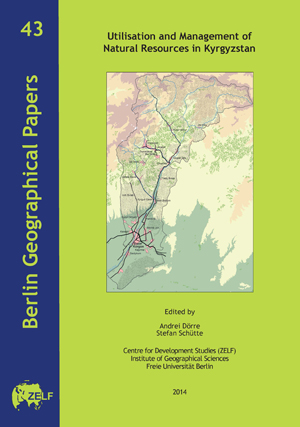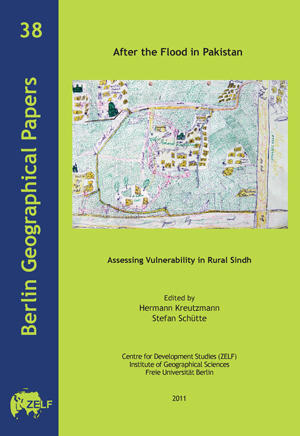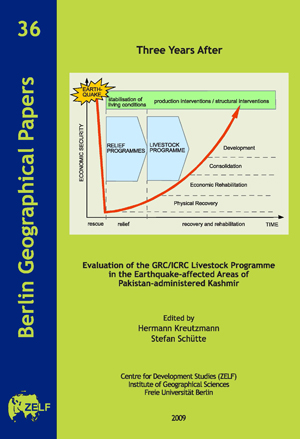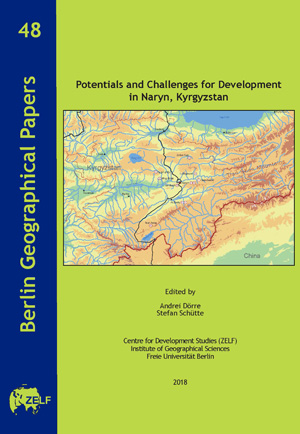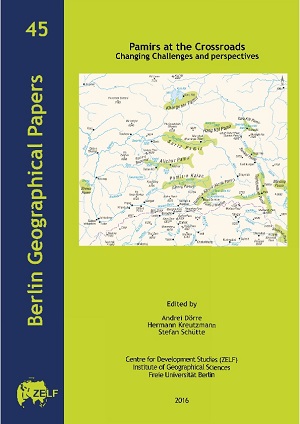Schütte, Stefan
Making a living in Varanasi: Social place and socio-economic space
The three-semester long project was implemented in Varanasi in close cooperation with Prof. Rana PB Singh and his colleagues and students from the Department of Geography at Banaras Hindu University and with the help of a number of established contacts in the city. We could form nine mixed groups of people with local knowledge and orientation that paired with a couple of students each from the Berlin team. The thematic focus was directed on ‘Making a living in Varanasi – social place and socio-economic space’. Beyond Varanasi’s attraction as a holy pilgrimage destination and place for worship we primarily looked at professions and locations that provide opportunities for making a meagre living by hard work. Consequently, certain trades and professions, groups and communities, individuals and office-bearers who kindly allowed us to observe, follow and sit with them during their working hours and to visit them at home contributed to form a selective mosaic of living conditions in Varanasi. All nine contributions in this volume are based on the findings from these joint-endeavours that were regularly discussed and re-adjusted during our bilateral discussions and plenary meetings at night in our temporary home in Varanasi. During a follow-up seminar back in Berlin the outcomes and results were again refined and processed to such a state that we could prepare the manuscripts in a manner that they fulfilled the formal requirements which a scientific journal would demand for.
Utilization and Management of Natural Resources in Kyrgyzstan
The training of students in the Department of Geography at the Centre for Development Studies (ZELF) of the Freie Universität Berlin includes the scientific preoccupation with theories of development, with social inequalities at multiple scales reaching from global to local arenas, and with questions of international development policies and practices aimed to ensure basic needs and sustainable development. (...) Following this approach, the project in 2013 was dedicated to specific issues of Kyrgyzstan’s development after 1991. The rural population of the post-socialist society depends to a great extent on the utilisation of natural resources, and the project focused primarily on the use and the management of natural resources that occur in the context of development efforts of governmental and non-governmental institutions.
After the Flood in Pakistan: Assessing Vulnerability in Rural Sindh
After the devastating floods of August-September 2010 had destroyed the living abodes and detrimentally affected the basic resources of several million people in Pakistan, the subsequent relief operations were supposed to be terminated half a year later. By March 2011 a new phase with coordinated steps for mid-term rehabilitation and long-term development activities were envisaged. The way forward posed a major challenge. (...)
The report presented here draws the attention to one of the least-studied regions of Pakistan and to three districts in Sindh Province. The report covers eight villages in Sindh's Badin, Dadu, and Thatta districts. The selection of villages is strongly linked to the initiators and sponsors of this independent research project. The German Red Cross (GRC) and the Pakistan Red Crescent Society (PRCS) suggested to the Centre for Development Studies at Freie Universität Berlin to cooperate again - after a successful joint evaluation of development packages in Kashmir in 2009 (see volume 36 of this series) - in an assessment in Sindh Province. This time, the terms for the assessment followed a different rationale in involving the independent academic supporters. (...)
The objectives were wide-spread and far-reaching: First, to gain some insight into the socio-economic situation of rural communities in a wider setting of their districts, in their relationship to developments in Sindh province and within Pakistan. Second, to analyse the social set-up in rural Sindh in terms of vulnerability and exposure to risk. Third, to assess the impact the recent floods had on the livelihoods of households in the village settings. Fourth, to formulate recommendations for implementation of project packages. (...) The result of our work is presented in this report.
Three Years After: Evaluation of the GRC/ICRC Livestock Programme in the Earthquake-affected Areas of Pakistan-administered Kashmir
Three years after the devastating earthquake in Pakistan-administered Kashmir most relief and development programmes have gradually cut down their activities to help local communities recuperate from the disaster. In the immediate aftermath of the October 8th, 2005 earthquake a number of national and international relief organisations engaged in activities to support local communities. These activities have only rarely been evaluated to determine whether they had a mid-range or longer-lasting impact on the livelihoods of the affected people.
The report presented here is the result of an impact assessment of a livestock project implemented in the earthquake affected areas by the German Red Cross (GRC) in collaboration with the International Committee of the Red Cross (ICRC). This assessment was a joint effort of the relief and development activities executed by GRC/ ICRC, and academia from the Centre for Development Studies in the Institute of Geographic Sciences at Freie Universität Berlin. The participatory evaluation involved experienced staff from the Red Cross and representatives of village communities from the four Union Councils in Muzaffarabad District that were severely affected by the earthquake. Both acted as valuable knowledge resources, interpreters and mediators in focus group discussions and expert interviews that were conducted during the three weeks of fieldwork between March 18 and April 2, 2009. (...)
The prime objective of this joint programme was to evaluate the impact of a livestock package that intended to augment the livelihoods and provide a resource base for families affected by the earthquake, going beyond sheer disaster relief efforts and moving towards more sustainable development. The second objective was to identify achievements and short-comings of the livestock package in order to identify lessons-learned for future economic and social programmes in the context of post-disaster interventions.
Potentials and Challenges for Development in Naryn, Kyrgyzstan
After gaining independence in 1991, Kyrgyzstan experienced fundamental transformations of the political system, the economy and the sociocultural sphere. These transformations had various immediate impacts on the people’s daily life in terms of income generation, the provision with food and consumer goods, the management and use of locally available natural resources, as well as the availability of reliable social services, including health and education. Questions related to national belonging and religious identity represent another fundamental challenge of the post-Soviet era, requiring the search for new answers. Against this background, the student project focused on three thematic clusters including ten subprojects: I) ‘Economy: markets, trade, and agriculture’; II) ‘Connections and relations: rural-urban nexuses’; and III) ‘Culture and society: religion and identity’. The studies were conducted in close cooperation with the Naryn State University named after S. Naamatov located in Naryn Town, the administrative centre of Naryn Oblast’. Ten groups of up to three Kyrgyz and German students addressed specific issues through case study approaches applied in selected rural and urban settings of the province. The scope of the individual subprojects encompassed issues like the car trade and public transport system in Naryn Town, the bazaar economy of the city, trade and value chains of milk and other animal products, the management and utilisation of pastures and irrigation water, challenges related to drinking water supply, small-scale gold mining, endogenous development potentials, and the representation of national identity in the study region. This report includes a selection of the manifold results gained by the Kyrgyz-German student group, and presents six case studies addressing diverse topics
Pamirs at the Crossroads: Changing challenges and perspectives
The meeting ‘Pamirs at the crossroads’ was convened in the framework of the Pamir research project sponsored by the Volkswagen Foundation as a final conference that was looking back at what was achieved by previous academic and scientific activities in better understanding the historical heritage for path-dependent development. A further aspect of the ‘meeting of minds’ was to develop a vision for desiderata, short-comings and urgent needs directed towards Pamir-focused development and research efforts. All persons who could follow the invitation to convene in Berlin were experts in their respective fields thus representing a wide range of different personal experiences, professional backgrounds and upbringings. It was attempted to create a cross-border perspective that was focusing on a remote region in all countries that claim to have a share in the Pamirs. By looking from the periphery on local developments, regional connections, national dependencies and global networks the web of multi-fold interrelationships and contrasting perceptions emerged and illustrated the complex challenges to which this meeting of minds could contribute only some glimpses. The two-day deliberations were structured in five themes, two keynotes, and one summarising statement.



